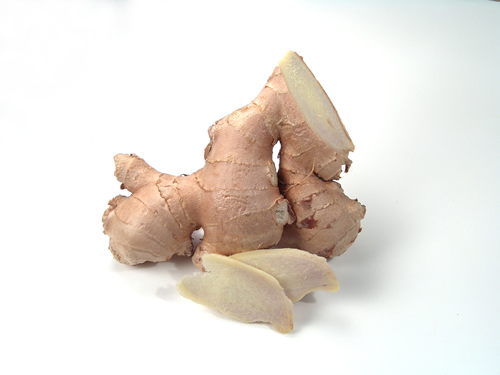Description
Botanical: Zingiber officinale
Other common names: African Ginger, Jamaica Ginger, Black Ginger, Chiang
Country of Origin: Jamaica
Beneficial Uses:
For nausea, Ginger is a wonderful and time-honored remedy. The herb is frequently used to settle a queasy stomach, control vomiting and colic, ease motion sickness and seasickness (some research showed it to be even better than Dramamine). Ginger has qualities that help to combat H. pylori, which can thus be useful in fighting ulcers. Although an old-time remedy for morning sickness, pregnant women should use Ginger sparingly and only with doctor's approval.
Ginger is said to improve digestion and has been known to pep up the appetite, promote saliva production, combat dyspepsia and relieve flatulent colic (it is said to prevent flatulence if included with the meal). It is also thought to be helpful for stomach cramps, alcoholic gastritis and hangover. The shogaol content in Ginger increases the activity of the digestive tract and is particularly helpful in digesting rich, fatty foods.
Ginger helps to encourage gentle muscle contractions throughout the digestive system, yet at the same time it inhibits muscle spasms, so it is said to be effective at controlling diarrhea.
Ginger has been used to cleanse the body of toxins through the skin by stimulating and increasing perspiration and has also been useful in breaking fevers. It is slightly diuretic and further cleanses the body by strengthening kidney function and increasing kidney filtration.
Ginger is a natural blood thinner and may help to lower risk of strokes, heart attacks and hardening of the arteries. The chemical gingerol appears to inhibit an enzyme that causes cells to clot and thereby reduces platelet aggregation and blood "clumping." Ginger helps to retard and decrease the production of cholesterol by the liver and has been known to reverse the increase in triglycerides and LDL cholesterol, thus helping to combat heart attack.
Because of its blood thinning qualities, promising research results show Ginger’s effectiveness in inhibiting clotting and protecting nerve cells in the brain. Ginger may not only help fight heart atttacks and strokes, but also be beneficial in lowering risk of Alzheimer's disease.
As an effective expectorant, Ginger has been used to rid the body of mucus buildup in the sinuses, throat and lungs. For centuries, the Chinese have used Ginger as a drying herb to eliminate mucus and have used it for colds, diarrhea and coughs. This sweet, pungent, aromatic and warming herb is still considered a fine treatment for congestion, colds, influenza, asthma and chronic bronchitis. It is said to ease cold symptoms, and the shagaol in Ginger is thought to kill cold viruses. Its pain-relieving properties have been said to ease the abdominal pain sometimes associated with colds and flu and also to counter the pain of strep throat.
Further supporting its pain killing and swelling properties, other pain-killing benefits attributed to Ginger include treatment of migraine headaches, menstrual cramps and the cramping caused by constipation. It is also thought to and relieve both the pain and stop the production of hormones that cause swelling in fibrocystic breasts.
Recent research indicates that Ginger is useful in the treatment of minor burns and skin inflammations.
Ginger is said to increase the absorption and efficacy of other herbs and drugs that are taken with it.
Ginger is considered effective in combating parasitic infection. In Japan, Ginger is included with sushi to ward off parasites and also to clear the palate and improve digestion. The chemical, zingibain, in Ginger kills the anisakid worm, a parasite sometimes carried in raw fish. The antibiotic activity of Ginger's shogaol and zingerone is said to strongly inhibit the growth of salmonella and other bacteria.
Ginger is a warming herb that is thought to strengthen the function of the kidneys, bladder, uterus and liver (increasing bile production). It is also said to help increase circulation of blood, including peripheral circulation (to hands, feet, etc.).
Contraindications:
People taking blood thinners (Coumadin, aspirin, etc.) should avoid Ginger Root, and the herb should be avoided for two weeks prior to elective surgery. Pregnant women should not take large amounts of Ginger for morning sickness, nor for prolonged periods and only after consulting a physician. Ginger Root increases bile production and should not be used by people with gallstones or gallbladder disease, unless supervised by a doctor.


